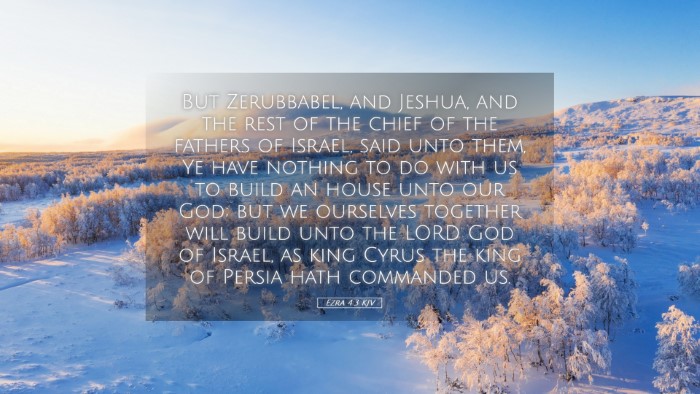Old Testament
Genesis Exodus Leviticus Numbers Deuteronomy Joshua Judges Ruth 1 Samuel 2 Samuel 1 Kings 2 Kings 1 Chronicles 2 Chronicles Ezra Nehemiah Esther Job Psalms Proverbs Ecclesiastes Song of Solomon Isaiah Jeremiah Lamentations Ezekiel Daniel Hosea Joel Amos Obadiah Jonah Micah Nahum Habakkuk Zephaniah Haggai Zechariah MalachiEzra 4:3
Ezra 4:3 KJV
But Zerubbabel, and Jeshua, and the rest of the chief of the fathers of Israel, said unto them, Ye have nothing to do with us to build an house unto our God; but we ourselves together will build unto the LORD God of Israel, as king Cyrus the king of Persia hath commanded us.
Ezra 4:3 Bible Commentary
Commentary on Ezra 4:3
Ezra 4:3 reads: "But Zerubbabel, and Jeshua, and the rest of the chief of the fathers of Israel, said unto them, Ye have nothing to do with us to build an house unto our God; but we ourselves together will build unto the LORD God of Israel, as King Cyrus the king of Persia hath commanded us."
Context and Background
The book of Ezra recounts the return of the Israelites from Babylonian exile and their attempts to restore Jerusalem and the Temple. Upon their return, they faced opposition from surrounding peoples. This passage reflects a critical moment in their endeavor when Zerubbabel and Jeshua firmly assert their commitment to the construction of the temple, rejecting the overtures of those who sought to join them under questionable intentions.
Analysis and Insights
Zerubbabel and Jeshua's Stance
According to Matthew Henry, Zerubbabel and Jeshua represent the true leaders of the Israelites in this return. Their strong refusal to accept assistance from the adversaries illustrates a significant theological principle of separation between the holy and the profane.
Albert Barnes emphasizes that the leaders’ determination to rebuild the temple with their own hands sternly represents their understanding that their mission was sacred and could not be compromised by alliances with those outside the covenant community.
The Nature of Assistance
The refusal of Zerubbabel and Jeshua is of utmost importance. Adam Clarke comments that this decision was based on the spiritual integrity of their mission. By rejecting the offer of the surrounding peoples, they affirm that the building of the temple is not merely a construction project but a covenantal obligation and an act of worship to God.
The leaders expressed a profound understanding of what was at stake during this rebuilding process; it was not simply a matter of erecting a physical structure but restoring the relationship and worship to Yahweh, the God of Israel.
Cyrus' Command and Divine Mandate
The conclusion of the verse refers to King Cyrus's initial decree that allowed the Israelites to rebuild their temple. Matthew Henry notes that this royal edict signifies God’s providence in sustaining His people even amidst potential opposition. The leaders recognized their moral duty to fulfill the divine mandate given through Cyrus, thereby acknowledging that their authority derived not from political alliances but from divine command.
Barnes elaborates on this point, suggesting that the leaders' actions are steeped in obedience to God's will. By distinguishing themselves and their mission, Zerubbabel and Jeshua model a faithful response to God’s directive and highlight the importance of divinely sanctioned work.
Theological Reflections
The Call for Spiritual Integrity
This verse illuminates the necessity for spiritual integrity in any endeavor. The notion that some may offer assistance outwardly but have ulterior motives calls for discernment among leaders within the church and community. Adam Clarke warns that not every offer of "help" is worthy of acceptance, especially if such offers threaten for the work of God to become diluted or compromised.
Maintaining the Purity of Worship
The leaders' assertion that they "will build unto the LORD God of Israel" stresses the importance of the purity of worship. Matthew Henry highlights that true worship must arise from a heart wholly committed to God, genuinely reflecting the relationship between God and His people. Any attempt to blend influences from outside the faith was seen as risking the authenticity of their worship.
The Role of Leadership
The decisive leadership of Zerubbabel and Jeshua serves as a model for contemporary leaders in the church. Their willingness to stand firm in the face of external pressures represents a critical attribute of godly leadership. Albert Barnes points out that leaders must often face opposition, and their strength is required to uphold God’s commands in challenging circumstances.
Practical Applications
- Discernment in Relationships: Pastors and church leaders are encouraged to be discerning about whom they partner with in ministry. Mutual understanding in faith and mission is vital.
- Commitment to God’s Cause: The narrative encourages believers to commit fully to their spiritual responsibilities, seeing their actions as fulfilling God’s work, rather than merely performing social deeds.
- Maintaining Integrity: In a wider societal context, this verse can remind Christians to hold to their values firmly, even amid pressures to conform or collaborate for expediency.
- Leadership Modeling: Leaders should strive to exemplify faithfulness and courage, creating a culture of integrity and commitment to God’s calling within their congregations.
Conclusion
Ezra 4:3 serves as a profound reminder of the necessity for spiritual integrity and unwavering commitment in the face of opposition. The example set by Zerubbabel and Jeshua continues to resonate with contemporary believers as they seek to fulfill their own calls to worship and service. As an enduring testament of godly leadership, this passage invites pastors, students, and scholars to reflect on the principles of discernment, commitment, and the integrity of worship in their lives and ministries.


